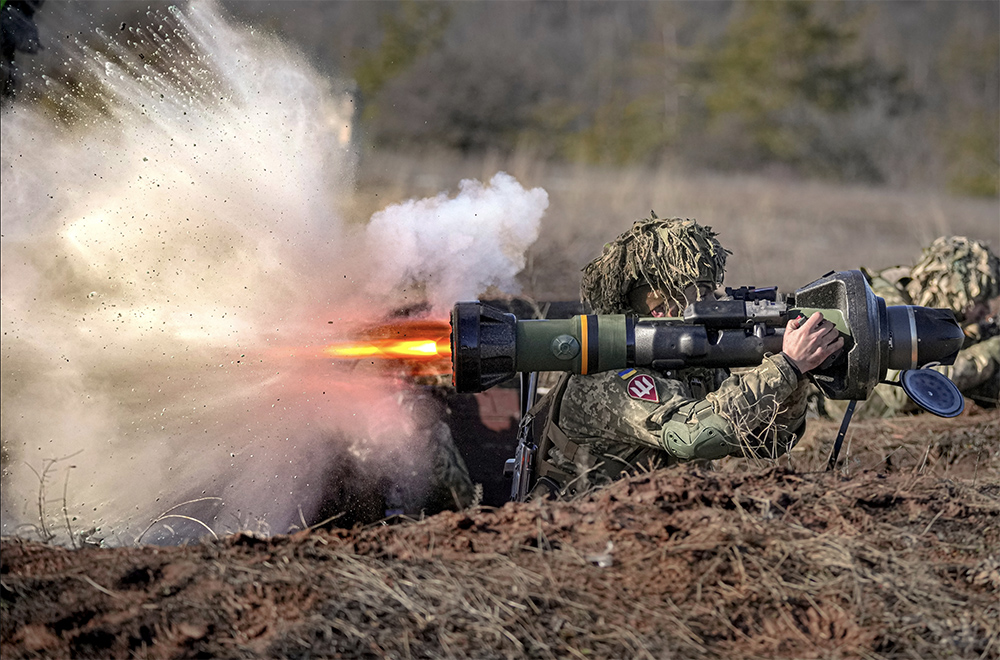Edited by: TJVNews.com
President Joe Biden announced the U.S. was ordering heavy financial sanctions against Russian banks and oligarchs on Tuesday, declaring that Moscow had flagrantly violated international law in what he called the “beginning of a Russian invasion of Ukraine,” as was reported by the AP in a breaking news report.
“None of us will be fooled” by Russian President Vladimir Putin’s claims about Ukraine, President Biden said. And he said more sanctions could be on the way if Putin proceeds further.
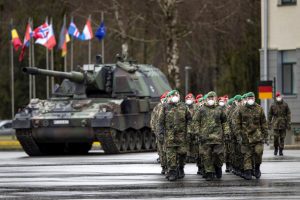
“We still believe that Russia is poised to go much further and launch a massive military attack against Ukraine,” Biden said, according to published reports.
The sanctions will target the Russian bank VEB and Russia’s sovereign debt, cutting the country off from Western financing. In the coming days, the sanctions will also target “Russia’s elites and their family members,” Biden said.
NBC News reported that Biden also said that he was moving some U.S. troops and equipment that are already in Europe to strengthen Baltic allies but said that it was a “defensive” move. “We have no intention of fighting Russia,” Biden said.
“As Russia contemplates this next move, we have our next move prepared as well. Russia will pay an even steeper price if it continues its aggression, including additional sanctions,” Biden warned.
Biden warned that the new sanctions being slapped on Russia may also cause some pain at U.S. gas stations, but he said that his administration is taking steps to keep prices down, according to a report on CNBC
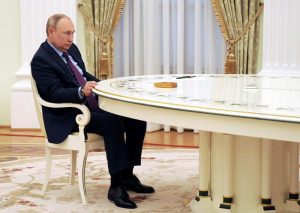
“As I said last week, defending freedom will have costs for us as well and here at home. We need to be honest about that,” Biden said at the White House.
“But as we do this, I’m going to take robust action to make sure the pain of our sanctions is targeted at [the] Russian economy, not ours,” he said, as was reported by CNBC.
“We’re closely monitoring energy supplies for any disruption. We’re executing a plan in coordination with major oil-producing consumers and producers toward a collective investment to secure stability in global energy supplies,” the president said. “This will blunt gas prices.”
“I want to limit the pain the American people are feeling at the gas pump,” Biden said. “This is critical to me.”
Biden joined the 27 European Union members who unanimously agreed on Tuesday to levy their own initial set of sanctions targeting Russian officials over their actions in Ukraine.
Russian lawmakers on Tuesday authorized President Vladimir Putin to use military force outside the country — a move that could presage a broader attack on Ukraine after the U.S. said an invasion was already underway there, as was reported by the AP.
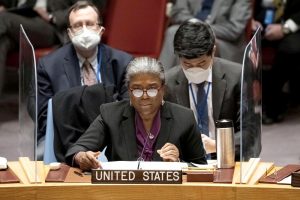
Several European leaders said Russian troops rolled into rebel-held areas in eastern Ukraine after Putin recognized their independence. But it was unclear how large the deployment was, and Ukraine and its Western allies have long said Russian troops were fighting in the region, allegations that Moscow always denied.
Members of Russia’s upper house, the Federation Council, voted unanimously to allow Putin to use military force outside the country — effectively formalizing a Russian military deployment to the rebel regions, where an eight-year conflict has killed nearly 14,000 people, according to the AP report.
Shortly after, Putin laid out three conditions to end the crisis that has threatened to plunge Europe back into war, raising the specter of massive casualties, energy shortages across the continent and economic chaos around the globe.
The AP reported that Putin said the crisis could be resolved if Kyiv recognizes Russia’s sovereignty over Crimea, the Black Sea peninsula that Moscow annexed from Ukraine in 2014, renounces its bid to join NATO and partially demilitarizes. The West has decried the annexation of Crimea as a violation of international law and has previously flatly rejected permanently barring Ukraine from NATO.
Asked whether he has sent any Russian troops into Ukraine and how far they could go, Putin responded: “I haven’t said that the troops will go there right now.” He added coyly that “it’s impossible to forecast a specific pattern of action –- it will depend on a concrete situation as it takes shape on the ground.”
With tensions rising and a broader conflict looking ever more likely, the White House began referring to the Russian deployments in the region known as the Donbas as an “invasion” after initially hesitating to use the term — a red line that President Joe Biden has said would result in the U.S. levying severe sanctions against Moscow, as was reported by the AP.
“We think this is, yes, the beginning of an invasion, Russia’s latest invasion into Ukraine,” said Jon Finer, principal deputy national security adviser, on CNN. “An invasion is an invasion, and that is what is underway.”
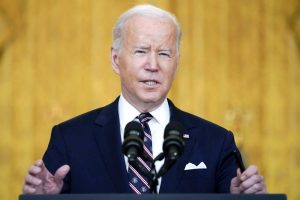
The Biden administration’s rhetoric hardened considerably in less than 24 hours, according to the AP report. The White House announced limited sanctions targeting the rebel-region Monday evening soon after Putin said he was sending troops to eastern Ukraine. A senior Biden administration official, who briefed reporters about the sanctions targeting the breakaway region, noted “that Russia has occupied these regions since 2014” and that “Russian troops moving into Donbas would not itself be a new step.”
The administration initially resisted calling the deployment an invasion because the White House wanted to see what Russia was actually going to do. After assessing Russian troop movements, it became clear it was a new invasion, according to a U.S. official who spoke on the condition of anonymity to discuss internal deliberations.
The AP reported that for weeks, Western powers have been bracing for this as Russia massed an estimated 150,000 troops on three sides of neighboring Ukraine — and promised swift and severe sanctions if it materialized. The European Union and Britain announced Tuesday that some of those measures were coming — and more were expected from the U.S., too.
Western leaders have long warned Moscow would look for cover to invade — and just such a pretext appeared to come Monday, when Putin recognized as independent two separatist regions in eastern Ukraine, where government troops have fought Russia-backed rebels. The Kremlin then raised the stakes further Tuesday, by saying that recognition extends even to the large parts now held by Ukrainian forces, as was reported by the AP.
Putin said Russia has recognized the rebel regions’ independence in the borders that existed when they declared their independence in 2014 — broad territories that extend far beyond the areas now under separatist control and that include the major Azov Sea port of Mariupol. He added, however, that the rebels should eventually negotiate with Ukraine.
Condemnation from around the world was quick, according to the AP report. Ukrainian President Volodymyr Zelenskyy said he would consider breaking diplomatic ties with Russia and Kyiv recalled its ambassador in Moscow.
But confusion over what exactly was happening in eastern Ukraine threatened to hobble a Western response. While Washington clearly called it an invasion, some other allies hedged.
“Russian troops have entered in Donbas,” EU foreign policy chief Josep Borrell said in Paris, as was reported by the AP. “We consider Donbas part of Ukraine.”
But he added: “I wouldn’t say that it is a full-fledged invasion, but Russian troops are on Ukrainian soil.”
Poland’s Defense Ministry and British Health Secretary Sajid Javid also said Russian forces had entered eastern Ukraine, with Javid telling Sky News that “the invasion of Ukraine has begun.”
Not all in Europe saw it that way. Spanish Foreign Minister José Manuel Albares noted “if Russia uses force against Ukraine, sanctions will be massive.”
The AP reported that the Kremlin hasn’t confirmed any troop deployments to the rebel east, saying it will depend on the security situation. Vladislav Brig, a member of the separatist local council in Donetsk, told reporters that the Russian troops already had moved in, but more senior rebel leaders didn’t confirm that. Late Monday, convoys of armored vehicles were seen rolling across the separatist-controlled territories. It wasn’t immediately clear if they were Russian.
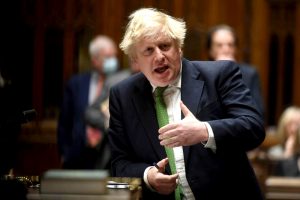
In response to the moves thus far, top EU officials said the bloc was prepared to impose sanctions on several Russian officials and banks financing the Russian armed forces and move to limit Moscow’s access to EU capital and financial markets. They gave few details.
EU foreign ministers met Tuesday to discuss the measures — but they did not appear to include the massive punishment repeatedly promised in case of a full-fledged invasion, as was reported by the AP.
British Prime Minister Boris Johnson also said the U.K. would slap sanctions on five Russian banks and three wealthy individuals.
While he said that Russian tanks have already rolled into eastern Ukraine, he warned a full-scale offensive would bring “further powerful sanctions.”
The AP reported that Johnson told lawmakers that sanctions would hit Rossiya Bank, IS Bank, General Bank, Promsvyazbank and the Black Sea Bank.
He said three Russian oligarchs with interests in energy and infrastructure — Gennady Timchenko, Boris Rotenberg and Igor Rotenberg — will have their assets frozen and be banned from traveling to the U.K., as was reported by the AP.
Johnson accused Putin of “establishing the pretext for a full-scale offensive” against Ukraine and said “further powerful sanctions” would follow, if that happened.
Top European Union officials said the bloc is set to impose sanctions on several Russian officials and banks financing the Russian armed forces as part of moves to limit Moscow’s access to EU capital and financial markets.
The actions, to be taken in the wake of Russia’s decision to recognize the independence of two separatist regions in southeast Ukraine and to deploy troops there, would “target those who were involved in the illegal decision,” an EU statement said, according to the AP.
The White House has also moved to respond, issuing an executive order to prohibit U.S. investment and trade in the separatist regions, and additional measures — likely sanctions — were to be announced Tuesday. The AP reported that those sanctions are independent of what Washington has prepared in the event of a Russian invasion, according to a senior administration official who briefed reporters on the condition of anonymity.
The AP also reported that German Chancellor Olaf Scholz said his country has taken steps to halt the process of certifying the Nord Stream 2 gas pipeline from Russia, as he slammed Putin’s actions on Ukraine as a “serious break of international law.”
The decision is a significant move for the German government, which had long resisted pulling the plug on the project despite pressure from the United States and some European countries to do so.
The pipeline was built to help Germany meet its energy needs, particularly as it switches off its last three nuclear power plants and phases out the use of coal.
Scholz told reporters in Berlin it was necessary to “send a clear signal to Moscow that such actions won’t remain without consequences,” according to the AP report. He said it is now “up to the international community to react to this one-sided, incomprehensible and unjustified action by the Russian president.”
Washington has for years argued that building another pipeline bringing natural gas from Russia to Germany increases Europe’s reliance on Russian energy supplies.
Even as alarm spread across the globe, Zelenskyy sought to project calm, according to the AP report. He said in an address overnight: “We are not afraid of anyone or anything. We don’t owe anyone anything. And we won’t give anything to anyone.”
His foreign minister, Dmytro Kuleba, is in Washington to meet with Secretary of State Antony Blinken, the State Department said.
Russia has long denied it has any plans to invade Ukraine, instead blaming the U.S. and its allies for the crisis and describing Ukraine’s bid to join NATO as an existential challenge to Russia. The AP reported that Putin reiterated those accusations in an hourlong televised speech on Monday, when he announced that Russia would recognize the rebels.
“Ukraine’s membership in NATO poses a direct threat to Russia’s security,” he said.
The Western rejection of Moscow’s demands gives Russia the right to take other steps to protect its security, Putin said, as was reported by the AP.
The Russian Foreign Ministry said Tuesday it will evacuate its diplomatic personnel from Ukraine “in the nearest time,” pointing to attacks on diplomatic buildings, cars and physical threats against diplomats in the Ukrainian cities of Kyiv, Odesa, Lviv and Kharkiv.
Convoys of armored vehicles were seen rolling across the Ukraine’s separatist-controlled territories late Monday, according to the AP report. It wasn’t immediately clear if they were Russian but NATO chief Jens Stoltenberg said Tuesday that “we saw last night that further Russian troops moved into the Donbas into parts of Donetsk and Lugansk.”
A vaguely worded decree signed by Putin late Monday cast his order for troops in the separatist territories as an effort to “maintain peace.”
The AP reported that protesters, some draped in Ukrainian flags, gathered outside the Russian Embassy in Kyiv. One held up a sign that read: “We choose Europe not Russia.”
NATO Secretary-General Jens Stoltenberg says Russia is taking military action against Ukraine and he condemned Moscow’s decision to recognize separatist areas of southeast Ukraine as independent, according to the AP report.
“Moscow has now moved from covert attempts to destabilize Ukraine to overt military action,” Stoltenberg told reporters Tuesday.
Asked whether Russia’s actions constitute an invasion, he said: “Russia has already invaded Ukraine, they invaded Ukraine back in 2014,” when Russia annexed the Crimean Peninsula. He added that “what we see now is that a country that is already invaded is suffering further invasion.”
The AP reported that Stoltenberg said NATO allies have more than 100 jet planes on high alert and more than 120 warships ready at sea from the high north to the Mediterranean Sea.
He said the NATO response force remains on high readiness but is not yet being deployed, although some allies are moving troops, ships and planes into the Baltic states and near the Black Sea to defend NATO allies.
The AP reported that President Biden and Putin tentatively agreed to a meeting brokered by French President Emmanuel Macron in a last-ditch effort to avoid war.
Kremlin spokesman Dmitry Peskov, though, said “it’s premature to talk about specific plans for a summit.”
Ukrainian Foreign Minister Dmytro Kuleba was in Washington on Tuesday to meet with U.S. Secretary of State Antony Blinken. Ukraine’s United Nations ambassador, Sergiy Kyslytsya, said during a Monday night Security Council meeting: “We are committed to a political diplomatic settlement and do not succumb to provocations.”
Ukraine’s U.N. ambassador demanded that Russia cancel its recognition of the independence of the separatist regions in the east, immediately withdraw its “occupation troops” and return to negotiations, as indicated in the AP report.
Sergiy Kyslytsya said during the Monday emergency meeting of the U.N. Security Council that Ukraine called the rare evening session to protest and condemn Putin’s “illegal and illegitimate” decision to recognize the separatist-controlled regions.
The AP reported that Kyslytsya said Ukraine’s internationally recognized borders “have been and will remain unchangeable regardless of any statements and actions by the Russian Federation.”
He said Putin’s moves “may be considered” as Russia’s unilateral withdrawal from the Minsk Agreements, which were aimed at restoring peace to eastern Ukraine.
Linda Thomas-Greenfield, the U.S. ambassador to the United Nations, dismissed “as nonsense” Putin’s assertion that Russian troops would be in eastern Ukraine as peacekeepers, saying their presence is “clearly the basis for Russia’s attemp
 t to create a pretext for a further invasion of Ukraine.”
t to create a pretext for a further invasion of Ukraine.”
The AP reported that Thomas-Greenfield said the Russian president has presented the world with a choice and it “must not look away” because “history tells us that looking the other way in the face of such hostility will be a far more costly path.”

